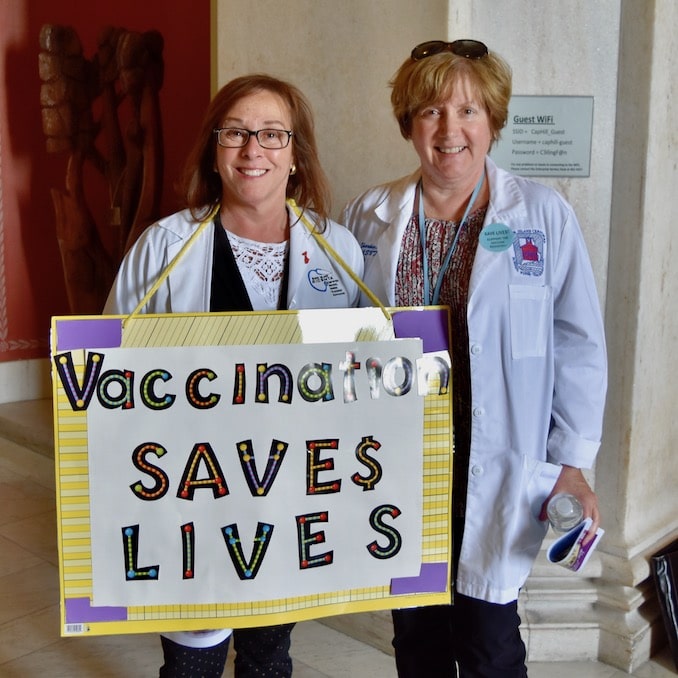The
quiet war on vaccines in the Rhode Island State house
 There is a quiet war going on at
the Rhode Island State House over
vaccines. Currently, vaccines for children are mandatory for both public and
private schools. The only exceptions are for medical and religious reasons.
There is a quiet war going on at
the Rhode Island State House over
vaccines. Currently, vaccines for children are mandatory for both public and
private schools. The only exceptions are for medical and religious reasons.
But bills submitted by
Representative Michael Morin and
Senator Maryellen Goodwin would allow for
exceptions to also be granted for “personal” and “philosophical” reasons.
Before I proceed further, let me
state this with certainty: Vaccines are safe. Vaccines save lives. Those saying
that there are links between vaccines and autism are woefully misinformed or
lying. Countless studies have demonstrated the safety and efficacy of vaccines.
One particularly robust study,
conducted in 2015 and published here, looked at over
96,000 children.
The report concludes: “In this large sample of privately insured children with older siblings, receipt of the MMR vaccine was not associated with increased risk of ASD, regardless of whether older siblings had ASD. These findings indicate no harmful association between MMR vaccine receipt and ASD even among children already at higher risk for ASD.”
The report concludes: “In this large sample of privately insured children with older siblings, receipt of the MMR vaccine was not associated with increased risk of ASD, regardless of whether older siblings had ASD. These findings indicate no harmful association between MMR vaccine receipt and ASD even among children already at higher risk for ASD.”
Very nice, very reasonable seeming
people testified in favor of personal and philosophical exceptions for
vaccinations in the House Health
Education and Welfare Committee on May 1. Many told stories of
children and family members who are “vaccine injured.” They talk of ailments
and illnesses that their loved ones (or themselves) suffered after being
vaccinated.
Despite this moving and
heartbreaking testimony, we know that correlation is not causation. If I eat a
peanut butter sandwich then get hit by a car, no one would think that the
peanut butter sandwich caused me to be hit by the car.
This applies to vaccine injury as
well: Though there are rare negative reactions to vaccines, it is wrong to
assume that because your vaccinated child was later diagnosed with autism, that
the vaccine caused the autism.
Rhode Island has won awards for our vaccination
rates from the Center for Disease
Control (CDC). Our
current policy of allowing exceptions only for medical and religious reasons,
seems to be working.
There was also a smaller continent
of people speaking against the bill in the House HEW Committee hearing.
For more on what the science says
and how science works, check out this piece, because
science doesn’t care about politics, and science doesn’t depend on what you may
believe.
The National
Academy of Medicine writes, “Vaccines offer the promise of protection
against a variety of infectious diseases. Despite much media attention and
strong opinions from many quarters, vaccines remain one of the greatest tools
in the public health arsenal. Certainly, some vaccines result in adverse
effects that must be acknowledged. But the latest evidence shows that few
adverse effects are caused by the vaccines reviewed in this report.”
 What does this mean for Rhode
Islanders? Unfortunately not much, because science does not determine policy,
politicians do.
What does this mean for Rhode
Islanders? Unfortunately not much, because science does not determine policy,
politicians do.
Uneducated politicians, like
Representative Robert Phillips (Democrat,
District 51, Woonsocket), thinks that the opinion of the pediatrician who looks
after the health of his children is somehow the equivalent of or even superior
to the opinions of experts, doctors and medical students.
“I’m going to take all of their
concerns, all of their testimony with a grain of salt,” said Phillips,
referring to the experts, “because my children’s pediatrician has sent a letter
to [this committee] last year and I have a copy of it again this year, that he
is in support of [expanding vaccination exceptions for personal and
philosophical reasons.]
“If we have medical people on both
sides, which ones do you weigh different?” asked Phillips.
Science is not often the winner in
public debates held before politicians. “We listen to and respect everybody’s
testimony,” said House HEW Chair Joseph
McNamara (Democrat, District 19, Warwick) “and very often those
stories that you have, personal stories, are the stories that really hit home…”
Another bill being considered by the
General Assembly this year, H5541, would allow
the Rhode Island Department of Health (DOH) to track adult vaccination
rates. Right now, Rhode Island is one of only two states without such a
registry. (The other being Connecticut.)
The pictures accompanying this post
are from a DOH lobby day, where medical experts and medical students reached
out to legislators to better explain vaccines and their importance. I spoke
to Neil Hytinen, RIDOH’s Chief
Public Affairs Officer/Legislative Liaison about the adult vaccine directory.
“Everywhere we’ve seen philosophical
exemptions we’ve seen higher rates of outbreak and disease spread,” said
Hytinen. “Everywhere these outbreaks are happening is where there is a large
group of vaccine-hesitant folks.”
As for the adult vaccine registry,
Hytinen says that the legislation would expand the childhood registry to a
lifetime registry. A lifetime registry “would allow us to see where there are
low rates of vaccination and target those areas for increased vaccination, and
respond in times of outbreak.”
Steve Ahlquist is a frontline reporter in Rhode
Island. He has covered human rights, social justice, progressive politics and
environmental news for half a decade.Uprise RI is his new project, and he's
doing all he can to make it essential reading.atomicsteve@gmail.com
